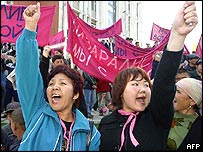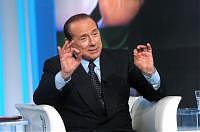March 30 Events in Iraq
Mossul. Six civilians killed in clashes between rebels and US forces.
Baghdad. A school security guard was killed in the explosion of a car bomb in Abu Ghraib.
Baquba. Two insurgents killed by the premature explosion of a roadside bomb which they were planting.
Balad. Rebel killed in clash with Iraqi army.
Doujaïl. A truck driver was kidnapped and a cab passenger killed.
Al-Sedira. An Iraqi soldier was killed when a mortar round hit a checkpoint.
Shirgat. One rebel was killed and another wounded in a police raid north of Shirgat.
Baïji. Two brothers, one who worked as truck driver for the army and the other who enlisted in the Iraqi army, were executed by a group linked to Abu Mussab al-Zarqawi.
Baghdad. US General Lance Smith of CENTCOM says US troop levels may fall at the beginning of 2006 if the insurrection weakens.
Paris and Brussels. Two demonstrations were held pleading for the release of kidnapped French reporter Florence Aubenas, and her assistant, Hussein Hanoun al-Saadi.
Washington. General Sanchez authorized brutal interrogation methods. Gen. Ricardo Sanchez permitted interrogation techniques which violated US military regulations. Sanchez ordered the use of dogs, stress positions, sensorial stress and "false flag" questioning where detainees were led to believe that they had been transferred to a third country for a torture session.
New York. Volcker Report: Paris and Washington reaffirm support for Kofi Annan
Berlin. Al-Zarqawi planned a chemical attack in Europe. The German monthy, Cicero, has printed a story saying Jordanian Abu Moussab al-Zarqawi planned to obtain chemicals from the North Causasus and Georgia for use in attacks in southern Germany and Berlin. Al-Zarqawi is said to have recruited a 150-man terrorist network inside Germany to carry out the attacks. [This is likely disinformation. The same story was about Jordan in April 2003--Nur]
Damascus. Syrian goverment protests accusations of involvement in the Iraqi insurgency. The Syrian Foreign Minister issued an official protest yesterday against Baghdad's claim that two Syrian intelligence agents, Ahmed Farra and Mahmoud al-Rammah, posing as leather merchants, delivered assistant to the insurgency. Syria has demanded the immediate release of the pair.
Basrah. British military apologizes for raid on residence of member of Parliament. The British Army apologized for a raid on the residence of Mansour al-Tamimi which was based on false information. British troops raided the home of the influential tribal leader in al-Zabair, south of Basrah, and arrested 10 family members.
Ankara. Turkey may grant permission to the US to use one of its military bases as a logistical center for operations in Iraq and Afghanistan. The airbase at Incirlik in Adana Province in southern Turkey may be used by Washington for civilian and military aircraft. The permission of Parliament will not be required since it had already granted the use of the base for humanitarian shipments to Iraq and Afghanistan.
23:42 Agreement on conditions for Sunni candidate for Speaker of the Assembly. Negotiations on a Sunni Speaker of the Assembly have resumed. Shi'ite demands are that the candidate 1) may not have served in Saddam's parliament, 2) may not have been a member of the Ba'ath Party and 3) is not a member of Iyad Allawi's "Iraqi List". Meanwhile Iraq's Sunnis are demanding the Defense portfolio, the Presidency and several important ministries. The Shi'ites categorically exclude the participation of any ex-member of the Ba'ath party in the new government.
23:38 Washington. Federal judge Henry Kennedy has blocked the transfer of more than 13 Yemeni prisoners out of the Guantanamo detention center without the exercise of their right to appeal their incarceration status. The decision arrives as Human Rights Watch reported the "disappearance" of a Yemani prisoner arrested in Egypt and transferred to Guantanamo 18 months ago. Kennedy noted that the USA acted unilaterally and silently to place Guantanmo prisoners out of the jurisdiction of US courts. The government is obliged to give detainees 30 days' notice before initiating their transfer to give attorneys a chance to challenge the decision.
19:53 Nassiriya. Italian troops find 1000 Kg of explosives in An Nasr, north of Nassiriya.
18:56 Mosul. Clashes between US troops and insurgents kill 6 and wound 5.
14:50 Sofia. Washington asks Bulgaria to cancel troop pullout. Deputy Secretary of State Robert Zoellick has asked Bulgaria to keep its 462-man contingent in Iraq. The Bulgarian goverment is to make a final decision today which will be submitted to Parliament in mid-April for ratification. Bulgarian Foreign Minister Solomon Passi says his government prefers not to be pressured before the upcoming elections. The Bulgarian Socialist Party (communist opposition) is leading in voter opinion polls ahead of June's elections and says it will demand an immediate pullout if it wins the elections.
14:43 Bucharest. No news on the condition of kidnapped Romanian reporters Marie-Jeanne Ion and Sorin Miscoci who were on assignment in Iraq for the private network Prima TV, and Edward Ohanesian of the Romanian daily, Libera. Romanian President Traian Basescu says there have been "favorable developments" suggesting their release. Romanian Prime Minister Calin Tariceanu says no ransom request has been received, although a Romanian businessman of Syrian origin, Omar Hayssam, says he has been contacted twice by the kidnappers.
02:28 London. Labour MPs plan anti-Blair revolt. Seventeen Labour MPs plan to defy Prime Minister Tony Blair by officially opposing the war in Iraq. The May 5th elections are expected to cause Labour a loss of seats in Parliament. MP Alan Simpson will head the group, Against The War.
02:18 Bucharest. Romanian TV says a ransom request has been received from the kidnappers of three Romanian reporters.
01:43 Washington. Rumsfeld plays down difficulties in forming new Iraq goverment. Rumseld dismissed Iraq's difficulties in forming a new government, saying it took the US Founding Fathers 13 years to form a government following the Revolutionary War.
00:20 New York. Kofi Annan says he has been exonerated of wrongdoing in the Oil for Food scandal by the Volcker Report.












